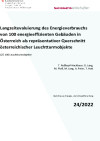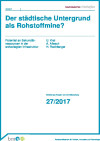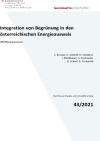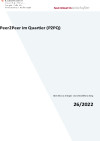Suchergebnisse für "Factsheet: Energietechnologien gestalten, die für alle sinnvoll und nutzbar sind"
Langzeitevaluierung des Energieverbrauchs von 100 energieeffizienten Gebäuden in Österreich als repräsentativer Querschnitt österreichischer Leuchtturmobjekte (LZE 100 Leuchtturmobjekte)

Erfassung, Auswertung und Analyse von Energieverbrauchsdaten von 100 energieeffizienten Gebäuden in Österreich über eine Betriebszeit von 3 bis 25 Jahren als repräsentativer Querschnitt der österreichischen Leuchtturmobjekte. Differenzierung nach Gebäudetypen, Energieträger und Ermittlung der realen Treibhausgas-Emissionen. Vergleich der gemessenen Verbräuche zu Benchmark-Werten.
Schriftenreihe
24/2022
T. Roßkopf-Nachbaur, G. Lang, M. Ploß, M. Lang, A. Peter, T. Hatt
Herausgeber: BMK
Deutsch, 143 Seiten
Downloads zur Publikation
Der städtische Untergrund als Rohstoffmine? Potential an Sekundärressourcen in der erdverlegten Infrastruktur

Machbarkeit eines Ressourcenkatasters zur Inventarisierung, Charakterisierung und Verortung der Materialbestände in den erdverlegten Infrastrukturnetzwerken österreichischer Stadtregionen. Das Ergebnis dient der ökonomischen Bewertung von Sekundärrohstoffpotenzialen.
Schriftenreihe
27/2017
U. Kral, A. Allesch, H. Rechberger
Deutsch, 73 Seiten
Downloads zur Publikation
THERM-opti-BALKON-P2 - Thermisch optimierte Balkonsanierung Phase 2: In-Situ-Versuchsanlage
Bei der thermischen Sanierung von Gebäuden stellen frei auskragende Balkone ein besonderes Problem dar. Mit dem THERM-opti-BALKON-System wird derzeit unter Laborbedingungen ein diesbezüglicher Lösungsansatz erforscht. Phase 2 soll eine In-Situ-Versuchsanlage unter realen Bedingungen als Technologiedemonstrator schaffen. Wichtigster Untersuchungsgegenstand ist das Langzeitverhalten des THERM-opti-BALKON-Systems.
Integration von Begrünung in den österreichischen Energieausweis (GREENergieausweis)

Anpassung der Berechnungsmodelle im Energieausweis derart, dass Gebäudebegrünung darin möglichst realistisch abgebildet werden kann und Abschätzung zur Akzeptanz einer Umsetzung bei relevanten Stakeholdern.
Schriftenreihe
43/2021
C. Kresser, E. Schriefl, H. Schöberl, I. Mühlbauer, S. Formanek, B. Scharf, G. Frühwirth
Herausgeber: BMK
Deutsch, 71 Seiten
Downloads zur Publikation
P2PQ - Peer2Peer im Quartier

Das Projekt Peer2Peer im Quartier befasst sich mit der konkreten Umsetzung von Anwendungen zu Photovoltaik-Eigenverbrauchsoptimierung sowie Peer-to-Peer-Beziehungen auf Basis der Blockchain-Technologie in Quartieren und deren Validierung im Echtbetrieb.
Schriftenreihe
26/2022
Herausgeber: BMK
Deutsch, 43 Seiten
Downloads zur Publikation
SCI_BIM - Scanning and data capturing for Integrated Resources and Energy Assessment using Building Information Modelling
The aim of the project is to increase the resources- and energy efficiency through coupling of various digital technologies and methods for data capturing (geometry and materials composition) and modelling (as-built BIM), as well as through gamification.
BIMstocks - Digital Urban Mining Platform: Assessing the material composition of building stocks through coupling of BIM to GIS
The main goal of BIMstocks is the development of a method for the digital capturing of the material composition of the existing building stock for follow up modelling of an Urban Mining Platform as well as for the prediction of the recycling potentials.
50 green houses - Development and demonstration of a low-tech façade greening system
Development of a cost-efficient all-in façade greening system („Greening-Toolkit“) including a maintenance concept, involving all trades and processes, for a broad (facing roads) implementation on facades in the urban built environment, combined with a process innovation for simplification of all necessary coordination processes.
PEQBacker: Integrated District Planning - Enabler on the way to a Plus-Energy District
Development of guidelines for the implementation of Plus-Energy District coordination units based on research of success factors, exploration of mission elements of existing structures and consultation of a broad stakeholder group with the goal of increasing the transformation of existing and emerging neighbourhoods toward Plus-Energy Districts.
VisErgyControl - Integral control system for daylight and artificial lighting for high visual and melanopic comfort with minimized primary energy consumption
Within the project VisErgyControl an integral, simulation-based, energy-efficient open loop daylight and artificial lighting control system had been developed. The research project focuses on the visual and melanopic requirements of users while minimizing the energy consumption for heating and cooling.
ZQ3Demo - Implementation of urban Future Quarters including stakeholder integration and legally and economically replicable solutions
ZQ3Demo accompanies three innovative urban quarters in Vienna to demonstrate and further develop ecologically and economically sustainable solutions for the implementation of Plus-Energy-Quarters (PEQ) on the basis of real-life examples.
Green and Resilient City - Management and planning tools for a climate-sensitive urban development
The aim of the project was to provide a "proof of concept" of a control loop and tool set for the management, optimization and evaluation of green and climate-sensitive urban (district) planning- The tool set consist of urban and open space planning instruments as well as climate simulations at different scale levels.
3D*3B - 3D-Concret Printing, Reinforcement for low carbon and bending stressed structures.
The project is about 3D printed structural elements and their integration in building structures. The focus is predominantly set on bending stresses structural elements like panels and slabs. Results will point out technical, logistic and climate relevant aspects.
SolCalc: Development of a standardized calculation algorithm for the energy consumption assessment and the energy certification of residential buildings with a solar fraction of up to 100% in combination with biomass boilers and heat pumps
Development of a standardized calculation algorithm for the energy consumption assessment and the energy certification of residential buildings with a solar fraction of up to 100% in combination with biomass boilers and heat pumps
RENOWAVE.AT - The innovation lab for sustainable, climate-neutral renovation of buildings and districts
RENOWAVE.AT will act as a central contact point for collaboration in innovation projects and provide systematic and early access to as well as promote innovative, scalable renovation concepts and sustainable renovation technologies within real development environments (open innovation principle).
M-DAB - Digitise, analyse and sustainably manage the city's material resources
The research project investigates how digital technologies can support us in determining the existing and future material resources in construction qualitatively (building materials and their recycling) and quantitatively (quantities of building materials).
BIMpeco - Environmentally relevant product data in collaborative BIM environments
Construction products can pose a risk to the environment and health due to their pollutant content or releases. In the BIMpeco project, workflows and data structures for digital information management of this environmentally relevant product data are developed. For this purpose, the new ISO standards ISO 23387 and ISO 19650-1 are tested and synchronized with established process flows. The project results will be made available on an open-source basis and can be integrated into any Common Data Environment (CDE) that complies with the standards mentioned. The BIMpeco project is the first to lay the foundations for product information management of environmentally relevant properties in the CDE, covering the entire lifecycle and supply chain.
Flucco+ - Flexible user comfort in quarter-hourly CO2-neutral Positive Energy Districts (PED)
The aim of the project is to improve the planning basis for the construction and operation of energy flexible buildings in three specific areas. First the further development of existing models of thermal comfort for dynamic situations, second the quantification of future energy grid usefulness and third the holistic testing of the developed comfort and CO2 model at three potential positive energy districts (PED), taking into account the ecological assessment as well as the life cycle costs.
NaNu3 - Parametric Planning for a Sustainable Roof (Blue, Grey and Green)
Demonstration of the feasibility and validation of a parametric model that can evaluate the practical and financial feasibility of the combined use of roof areas as well as its microclimate and environmental effectiveness at an early planning stage.
BIM2BEM Flow - Continuous BIM-based energy efficient planning
Automated integration and assignment of exchange requirements between the design and simulation programs, based on the elaborated exchange information requirements, should enable continuous energy efficiency planning along the design phase.
